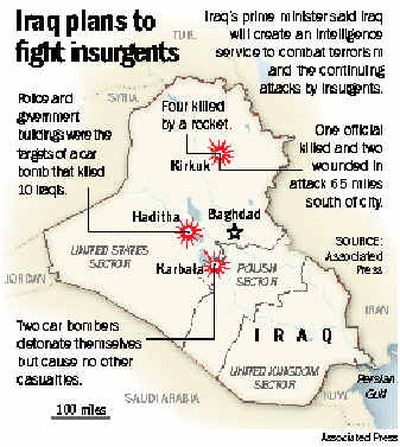Allawi vows to destroy rebels

BAGHDAD, Iraq – After a second massive car bombing in 24 hours, Iraqi Prime Minister Iyad Allawi vowed Thursday to “annihilate” militants and announced his interim government was forming a new national security agency to fight the insurgency.
A car bomb that blew up near a government complex in Haditha, about 100 miles northwest of Baghdad, killed 10 people, including three policemen. In Karbala, south of the capital, police apparently prevented more deaths when, acting on a tip, they chased an explosives-laden car. Two occupants blew up the vehicle, but no one else was hurt.
Insurgents also fired rockets into a refugee camp near the northern city of Kirkuk, killing six and injuring seven others. Militants also sabotaged Iraq’s main north-south pipeline in two places, setting off huge blazes and halting oil exports to Turkey.
In Mosul, Nineveh province security chief Salem Issa said police had identified a decapitated body found in the Tigris River a day earlier as the remains of Georgi Lazov, a Bulgarian hostage reported slain Tuesday by his captors. There was no word on the fate of a second Bulgarian whose abductors had threatened to kill him by Wednesday night unless U.S.-led forces released all Iraqi prisoners in their custody.
About midway along the highway between Baghdad and Kirkuk, gunmen fired on two cars carrying Foreign Ministry officials, killing one and wounding two others. Foreign Minister Hoshyar Zebari, who was not in the convoy, was thought to have been the target.
A rash of kidnappings and executions has imperiled military and civilian contingents working with the primarily American multinational forces.
A kidnapped Filipino truck driver who had been under threat of execution until Manila agreed to withdraw its last 43 troops here appeared on Al-Jazeera satellite channel to thank his government for acting to save his life. A Saudi company also announced it would cease business in Iraq to secure the release of its Egyptian employee abducted by militants who have threatened to kill him.
Allawi has adopted an aggressive security stance since his government took over from a U.S.-led occupation on June 28. The caretaker government has given itself the power to proclaim martial law, cracked down on crime in the capital and moved to re-integrate ousted members of Saddam Hussein’s deposed regime to lure them away from the insurgency.
Allawi added his voice to the displeasure expressed by U.S. and other officials over the Philippines’ decision to bow to insurgent demands to save the life of hostage Angelo de la Cruz, a father of eight.
In the Al-Jazeera broadcast, de la Cruz, who appeared unshaved and dressed in a black polo shirt, told his family that he would be home soon. The little-known militant group holding him, called the Islamic Army of Iraq-Khaled bin Waleed Brigade, said the 46-year-old would be freed when the last Philippine soldier leaves Iraq.
Manila’s contingent was scheduled to depart by Aug. 20, but that plan was moved up by a month to appease the kidnappers.
At the White House, Press Secretary Scott McClellan said President Bush found Manila’s actions “disappointing … because it does send the wrong signal to the terrorists.”
But McClellan indicated that the decision by the Philippines would not rupture relations with the United States.
At a news conference to unveil plans for the domestic security force, Allawi expressed sympathy for de la Cruz, his family and the Filipino people. But he urged Philippines President Gloria Macapagal Arroyo to reconsider her government’s decision to leave Iraq early.
“We cannot give way to terrorism,” he said.
Allawi said he was creating the General Security Directorate “to annihilate those terrorist groups, God willing.” His news conference was held only footsteps away from the scene of a Wednesday car bombing that killed 11 Iraqis.
Allawi also said he was asking a number of countries with significant Muslim populations to send forces to help secure the country, apparently in hopes that insurgents would be less likely to target fellow Muslims. He said he was in talks with Bangladesh, India, Pakistan, Morocco and Egypt.